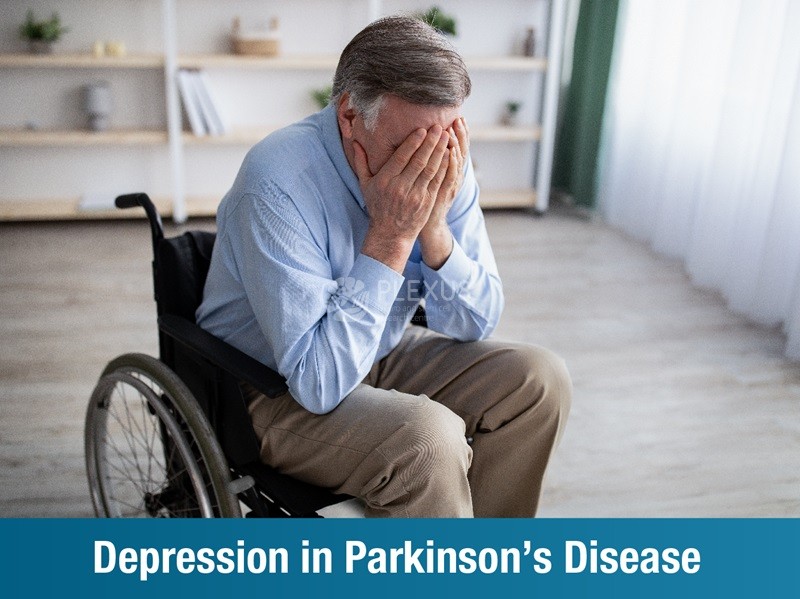
Parkinson’s disease (PD) is a progressive, chronic, and degenerative brain disorder that impairs muscle control, balance, and movement. It results in the deterioration of the cells in substantia nigra (in the basal ganglia). It inhibits the brain’s ability to produce dopamine, the happy hormone. As the disease progresses, the neurons in the brain completely deteriorate. This leads to severe motor impairment, tremor, stiffness, slowed or delayed movement, dysphagia, sleep issues, fatigue, difficulty in speech, etc.
Typically, Parkinson’s affects people over the age of 50. However, there are rare cases where even younger people are affected.
Symptoms of Parkinson’s
Following are the symptoms of PD:
- Tremors of the hands, arms, legs, jaw, and face
- Numbness or weakness in the limbs
- Impaired balance and coordination
- Rigidity
- Slurred speech
- Spastic limb movements
- Loss of bladder and bowel control
- Depression and anxiety
- Hypomimia or masked face
- Micrographia or small handwriting
- Dizzy spells
- Stooped posture
- Dragging of feet
- Episodes of freezing of movement
- Short stepping/shuffling gait
- Slowing of movement (bradykinesia)
- Dysphagia and drooling
- Hypophonia or unusually soft voice
- Loss of muscle control in first one side of the body and then the other
- Loss of control over movements like blinking or smiling
Rehabilitation for Parkinson’s in Bangalore
The symptoms of PD may be controlled by using a combination of drugs, therapies, and occasional surgeries. Medication is the most effective method of managing the symptoms of PD. It helps in increasing the level of dopamine that reaches the brain and stimulates the parts of the brain where dopamine works. However, medication may have a different impact on different individuals. Some important drugs for PD are: Levodopa, Dopamine Agonists, Apomorphine, Glutamate Antagonist, Anticholinergics, COMT inhibitors, MAO-B inhibitors.
Therapies like occupational therapy, speech and language therapy, physiotherapy, etc., help a great deal in controlling the symptoms of PD.
Surgery is usually not recommended in PD. Only those patients who are not responding to medicines are advised surgery. This too can give some people better control over their symptoms but it is definitely not a cure. The main types of surgery available for the management of PD are:
- Deep brain stimulation
- Lesion techniques
- Other surgical operations
Stem cell therapy for Parkinson’s
At Plexus, we use autologous mesenchymal stem cells taken from the patient’s own body. These stem cells are curated in a laboratory and then injected into the patient’s body. These injected cells have the potential to develop into dopamine-secreting neurons and slow down the progression of Parkinson’s, reducing the severity of Parkinsonian symptoms, and giving the patient more than just a fighting chance against the progressive disease.
Apart from stem cell therapy, our parkinson’s rehabilitation programme also comprises physiotherapy, movement therapy, occupational therapy, speech and language therapy, and cognitive rehabilitation therapy.
Depression and Parkinson’s Disease
Depression is one of the most serious mental illnesses. It changes one’s behaviour, personality, and even body. Studies have shown depression reduces the individual’s quality of life.
Symptoms of depression include:
- Feeling anxious or empty
- Feeling persistently sad
- Feeling hopeless
- Feeling guilty, worthless or helpless
- Feeling restless or irritable
- Feeling tired all the time
- Lack of motivation
- Insomnia or sleeping all the time
- Overeating or loss of appetite
- Suicidal tendencies
- Digestive problems, headaches, cramps, aches and pains
- Difficulty in concentrating, remembering details or making decisions
- Loss of interest in activities that the individual once found enjoyable
Common symptoms
There are some symptoms that are common to both depression and Parkinson’s. Some of these are –
- Fatigue
- Lacking energy
- Insomnia and sleep problems
Parkinson’s patients may also experience depression. These patients can find it extremely difficult to manage the symptoms of both their conditions. They tend to experience greater levels of anxiety and have greater motor impairment as compared to those who have only PD.
Causes of Depression
Depression may be attributed to:
- Family history
- Childhood trauma
- Drug abuse
- Certain medical conditions
- Neurological disorders such as –
- Epilepsy
- Migraine
- Eating disorders
- Parkinson’s Disease
- Alzheimer’s Disease
- Dementia
- Mood disorders
- Obsessive compulsive disorder (OCD)
- Psychotic disorders
- Sleep disorders
You can read more about depression here.
Rehabilitation for Depression in Bangalore
The most common methods to manage depression include:
- Counseling – To understand underlying causes
- Cognitive Behaviour Therapy (CBT) or talk therapy – To help patient come to terms with negative thoughts, and improve their thoughts and behavior
- Antidepressants – To moderate symptoms
Being diagnosed with PD can be very stressful and upsetting. As a sense of despair sets in many patients, depression can also follow suit.
While helping you manage your symptoms of PD, your doctor will also actively monitor your behavioural patterns for depression.
We urge you to reach out for help the moment you feel something’s not quite right. Depression is not the end of the road. It is merely a detour that can be managed.
On your part, you must ensure you get adequate sleep, eat well-balanced meals, and follow an exercise routine. It’s the simple things that can help you fight depression.
At Plexus’ Neuropsychiatric Care Clinic, Dr Na’eem Sadiq and his team of neuropsychiatric experts will help you manage your depression. We offer customised rehabilitation programmes that will enable you to find a renewed purpose in life.
Book an appointment with us today.
WhatsApp +91 89048 42087
Call +91 78159 64668 (Hyderabad) | +91 82299 99888 (Bangalore)










